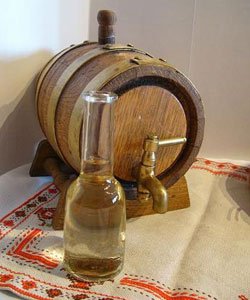

© Photo: Lyudmila Savova
In times of crisis a number of Bulgarians are concerned with prices and wonder which type of rakia is cheaper. The homemade, of course. Production of rakia at home is a part of the Bulgarian culture in a number of regions. The tradition is attractive to foreigners, too. Two years ago the retired English policeman Michael Weavers, who now lives in the Bulgarian village of General Toshevo won the local rakia competition. The locals now call him with respect Bai Michael.
It is known that monks from the monasteries near the town of Troyan in Central Bulgaria are masters of the plum rakia, which is prepared according to a recipe from the 19th century. At least 12 different types of herbs are used but special varieties include 33 herbs. In the monasteries the rakia is stored in oak casks. Before pouring the rakia into bottles, it is blessed in front of an icon of St. George.  Vassil Mandzhukov from the village of Oreshak told us more about the tradition of rakia production. “You should only drink rakia that has aged for 12 years,” he claims. “When we make rakia, we keep it in an oak cask for 6 months, before pouring into glass bottles and burying them in the ground,” he explains and adds: “Aged rakia has different qualities and that is why my father diet at 95.”
Vassil Mandzhukov from the village of Oreshak told us more about the tradition of rakia production. “You should only drink rakia that has aged for 12 years,” he claims. “When we make rakia, we keep it in an oak cask for 6 months, before pouring into glass bottles and burying them in the ground,” he explains and adds: “Aged rakia has different qualities and that is why my father diet at 95.”
English: Alexander Markov
8 December is the day on which Bulgarian university students traditionally celebrate their holidays. The holiday is very popular in Bulgaria and often brings together not only current but also former students. The day was first celebrated in 1903..
Spicy means culture and Alexander Kyurkchiev - Sando, founder of a chilli pepper farm near Sofia and the first chilli pepper museum in this country, is sure of this. For the second year in a row he is organizing the Sofia Chilli Fest..
For more than a week now, the story of a family of breeders raising local breeds of sheep has captured the attention of not only the Bulgarian public, but also of compatriots abroad. Instead of following the drama in Parliament and the struggle for..
The village of Zmeyovo near the town of Stara Zagora is celebrating today, December 21, its traditional Festival of Pelin Wine. According to an..
Each piece evokes warmth and nostalgia because each is handmade and unique. The silvery reflections on the glass baubles take us back to childhood, when..
The making of knitted products is a traditional craft that deserves a revival and a new life, believes Alexandrina Pandurska, known for her numerous..

+359 2 9336 661
